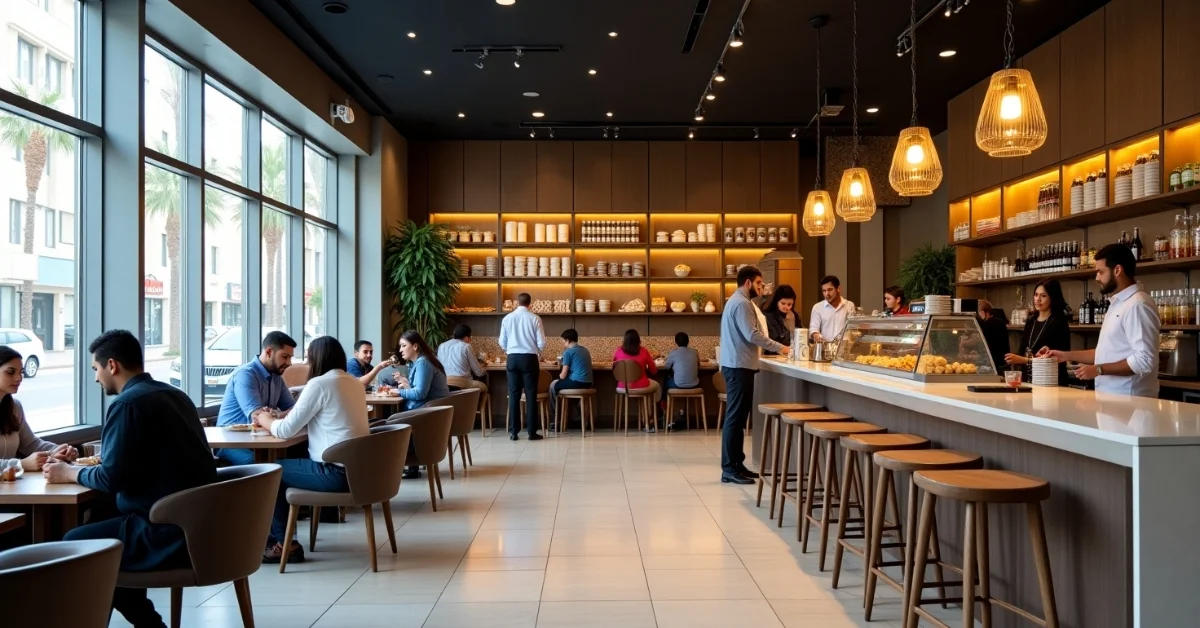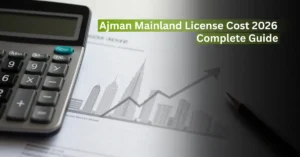Starting a Dubai cafeteria is one of the most rewarding business opportunities in the UAE. With a fast-growing food and beverage industry, supportive business policies, and a diverse customer base, Dubai offers the perfect environment for aspiring entrepreneurs. This guide walks you through the benefits, requirements, documents, costs, and steps to launch a successful cafeteria.
Why Start a Cafeteria Business in Dubai?
1. Growing Food and Beverage Market in the UAE
Dubai’s F&B industry continues to expand, supported by strong demand for dining outlets. Cafeterias remain a popular choice for both residents and tourists seeking quick, affordable meals.
2. Dubai’s Diverse Expat and Tourist Community
With millions of expatriates and tourists visiting each year, Dubai provides a steady stream of customers. A well-located cafeteria can serve a wide mix of cultures and tastes.
3. Supportive Business Policies and Tax Benefits
Dubai offers low tax rates, straightforward business regulations, and investor-friendly policies. These factors make opening a cafeteria more accessible compared to many other global cities.
4. Rising Demand for Affordable Dining Options
From office workers to students and travelers, people in Dubai often look for pocket-friendly meals. A cafeteria that delivers both quality and value can attract strong daily footfall.
5. High Return on Investment Opportunities
With the right location, quality menu, and efficient management, cafeterias in Dubai often achieve profitability faster than many other businesses.
Legal Requirements for a Dubai Cafeteria Setup
1. Food Safety and Hygiene Standards
When you open a Dubai cafeteria, you must follow strict food safety rules set by the Dubai Municipality. These rules protect public health and ensure your business runs without risks. You need to store food at the right temperature, keep raw and cooked items separate, and use proper packaging. Your staff should follow hygiene practices such as wearing gloves, keeping the kitchen clean, and maintaining equipment regularly. Regular inspections from the municipality make sure your cafeteria always meets these standards.
2. Location and Premises Approval Rules
Before you start operations, the Dubai Municipality checks whether your cafeteria’s premises are suitable for food service. The building must have proper ventilation, safe drainage, fire safety equipment, and pest control measures. The kitchen should have enough space for cooking, storing, and cleaning activities without overlap. Once your layout meets these health and safety requirements, the municipality approves, allowing you to move forward with your setup.
3. Trade License and Cafeteria License Guidelines
No cafeteria in Dubai can operate without a valid license. You must first apply for a trade license from the Department of Economic Development (DED). After that, you need a food license from Dubai Municipality, which allows you to prepare and serve food legally. These licenses prove that your cafeteria follows UAE business laws and food safety regulations. Operating without them can lead to fines, closure, or even a ban on your business. By securing both licenses, you ensure your cafeteria is fully compliant and ready to welcome customers.
Documents Needed for a Dubai Cafeteria License
When applying for a Dubai cafeteria license, you need to prepare specific documents. Having them ready in advance will make the process smoother and help you avoid delays. Below are the key documents explained in detail:
1. Passport and Emirates ID (for owners/shareholders)
Every owner or shareholder must submit a valid passport copy. If you are a UAE resident, you also need to provide a copy of your Emirates ID. These documents confirm your identity and ownership in the business.
2. Trade Name Reservation Certificate
Your cafeteria must have an official trade name approved by the Department of Economic Development (DED). The trade name should follow UAE naming rules and avoid restricted terms. Once approved, you receive a reservation certificate that you include in your license application.
3. Initial Approval from DED
This is one of the most important steps. The DED issues an initial approval that allows you to continue with the setup process. Without it, you cannot apply for further permits or finalize your location. It serves as a green light to proceed with your cafeteria project.
4. Ejari (Tenancy Contract) for Premises
To open a Dubai cafeteria, you must have a physical location. Your tenancy contract, registered through the Ejari system, proves that you have secured a legal business address. This contract is also needed for municipality inspections and license approvals.
5. Blueprint and Layout Plan Approved by Dubai Municipality
You need to submit a detailed layout of your cafeteria, including kitchen, storage, preparation, and seating areas. The design must follow Dubai Municipality’s food safety and hygiene regulations. Only after the municipality approves your blueprint can you begin the fit-out and equipment setup.
6. NOC from Existing Sponsor (if applicable)
If you are currently under another UAE sponsor, you must obtain a No Objection Certificate (NOC). This document shows that your sponsor has no issues with you starting a cafeteria business. Without it, your license application will not move forward.
1. Checklist of Required Documents:
- Passport copies of owners/shareholders
- Emirates ID copy (for residents)
- Trade name reservation certificate
- Initial approval from DED
- Ejari tenancy contract for your cafeteria premises
- Municipality-approved blueprint and layout plan
- NOC from current sponsor (if required)
Having these documents in order not only speeds up your licensing process but also ensures your cafeteria is legally compliant from day one.
Step-by-Step Process to Open a Dubai Cafeteria
Starting a Dubai cafeteria involves several legal and practical steps. Following the process carefully will save you time and help you launch successfully.
1. Conduct Market Research and Build a Business Plan
The first step is to study the local food market. Identify who your customers are: students, office workers, or tourists, and analyze what they prefer. Look at your competitors to understand their strengths and weaknesses. Based on this, prepare a solid business plan that covers:
- Your menu and pricing strategy
- Estimated startup and running costs
- Marketing approach to attract customers
- Growth goals and expansion plans
A well-prepared business plan also makes it easier to secure investors or financing.
2. Choose Your Business Structure (LLC or Sole Establishment)
The legal structure of your cafeteria matters. In Dubai, most cafeterias are set up as Limited Liability Companies (LLC) because they allow multiple partners and provide flexibility. However, if you are starting small, you may choose a sole establishment. Always consider ownership rights, liability, and visa eligibility before finalizing the structure.
3. Reserve Your Cafeteria Trade Name
You must register a trade name with the Department of Economic Development (DED). The name should be unique, easy to remember, and aligned with your brand identity. Avoid restricted words or terms that violate UAE naming rules. Once approved, you receive a trade name reservation certificate.
4. Apply for Initial Approval and Cafeteria License
Submit your application and required documents to the DED for initial approval. This step confirms that your business idea is acceptable and allows you to proceed with location and licensing requirements. After securing approvals, apply for your cafeteria trade license, which is mandatory to operate legally.
5. Obtain Food License and Required Permits
In addition to your trade license, you must obtain a food license from Dubai Municipality. This permit ensures that your cafeteria meets food safety, hygiene, and handling standards. Depending on your services, you may also need special permits for food delivery or catering.
6. Secure a Suitable Location and Municipality Approval
Location plays a huge role in the success of a cafeteria. Choose an area with heavy footfall, such as business districts, residential zones, or near universities. The premises must also meet Dubai Municipality requirements for ventilation, drainage, and safety. Only after the municipality approves your location can you begin setting up.
7. Design Fit-Out, Kitchen Layout, and Equipment Setup
Your cafeteria’s layout must be practical and customer-friendly. Submit a blueprint of your design to the Dubai Municipality for approval. After approval, install:
- Essential kitchen equipment (stoves, ovens, refrigerators)
- Food preparation and storage areas
- Comfortable seating and interiors for customers
A well-planned fit-out not only meets health standards but also enhances the customer experience.
8. Apply for Visas for Investors, Staff, and Family
Once your cafeteria license is active, you can apply for visas. These include:
- Investor or Partner Visa for business owners
- Employee Visas for staff members
- Family Visas if you plan to sponsor dependents
The number of visas you can request depends on the size of your premises and license type.
9. Hire Skilled Chefs and Service Staff
Good staff are the backbone of a successful cafeteria. Hire experienced chefs, kitchen helpers, and customer service staff. Provide training to ensure they follow hygiene standards and maintain service quality.
10. Plan Marketing Campaign and Launch Your Cafeteria
Before opening day, create a buzz around your cafeteria. Use:
- Social media platforms like Instagram and Facebook
- Online delivery apps such as Talabat and Zomato
- Local flyers, posters, and word-of-mouth campaigns
On launch day, consider offering promotions or discounts to attract your first wave of customers.
Estimated Cost Breakdown for a Dubai Cafeteria
| Expense Category | Details |
| Cafeteria License Fees | Trade license + food license from DED and Dubai Municipality |
| Location and Rental Expenses | Rent for cafeteria space (varies by area, size, and demand) |
| Fit-Out, Equipment, and Interiors | Kitchen appliances, seating, décor, lighting, and interiors |
| Staff Salaries and Visa Costs | Monthly wages, visa processing, medical, Emirates ID, accommodation |
| Marketing and Promotion Budget | Digital marketing, food delivery apps, local advertising, customer loyalty |
Cafeteria Licenses in Other Emirates
While Dubai remains a top choice for food entrepreneurs, other emirates also provide excellent opportunities to open a cafeteria. Each emirate has its own rules, costs, and advantages.
1. Cafeteria License in Sharjah
Sharjah is known for its lower business costs compared to Dubai. License fees and rental expenses are more affordable, which makes Sharjah attractive for entrepreneurs starting small. The approval process is straightforward, and the emirate has a growing student and family population that creates steady demand for cafeterias.
1. Why choose Sharjah?
- Lower rental and setup costs
- Easier approval process for food outlets
- Strong local demand from students and families
2. Cafeteria License in Ajman
Ajman is one of the most cost-effective emirates for new business owners. Cafeteria licenses here are simpler to obtain, and rental prices are significantly lower than in Dubai or Abu Dhabi. Ajman’s compact size means businesses can build a loyal local customer base quickly.
Benefits of opening in Ajman:
- Very affordable business setup costs
- Simple regulations and quick approvals
- Suitable for entrepreneurs testing the F&B market
3. Cafeteria License in Abu Dhabi
As the capital of the UAE, Abu Dhabi offers strong potential for growth. The city has a high-income population, busy commercial districts, and a large tourist inflow. Although setup costs are higher than in Sharjah or Ajman, the customer base is larger and more diverse, leading to higher profit margins.
Advantages of Abu Dhabi:
- Access to a wealthy customer base
- Opportunities in high-traffic commercial areas
- Strong tourism-driven demand for dining options
Tips to Run a Successful Dubai Cafeteria
Running a cafeteria in Dubai requires more than just obtaining licenses; it’s about offering value, building trust, and staying competitive.
1. Focus on Quality and Hygiene
Customers in Dubai place high importance on food safety. Consistent cleanliness in your kitchen, seating area, and staff practices builds trust and keeps customers coming back.
- Train staff on hygiene protocols
- Store and prepare food according to Dubai Municipality rules
- Schedule regular cleaning and maintenance
2. Offer Unique Menu and Affordable Pricing
Cafeterias thrive when they provide variety and value. You don’t need a luxury menu; instead, focus on tasty, affordable meals that stand out.
- Create a signature dish or drink to attract repeat customers
- Offer daily specials or combo meals
- Balance affordability with quality to appeal to all customer groups
3. Use Digital Marketing and Online Delivery Apps
In Dubai, most customers order food online. Partnering with delivery apps expands your reach beyond walk-in customers. At the same time, digital marketing builds visibility and helps you connect with your target audience.
- List your cafeteria on platforms like Talabat, Deliveroo, and Zomato
- Use Instagram and TikTok for food promotions and ads
- Encourage satisfied customers to leave online reviews
4. Build Loyalty with Customer-Centric Service
Friendly service is one of the easiest ways to win customer loyalty. People remember how they are treated, not just what they eat.
- Train staff to greet customers warmly and serve quickly
- Offer loyalty programs such as “buy 5 meals, get 1 free”
- Collect customer feedback and make improvements
Partner with Ripple LLC for Your Dubai Cafeteria Setup
Starting a Dubai cafeteria involves multiple legal steps, approvals, and strategic planning. At Ripple, we make the process simple and hassle-free. From obtaining your trade license to securing food permits, our experts guide you through every step of business setup in Dubai.
With years of experience in UAE business consultancy, we ensure your cafeteria launch is smooth, compliant, and ready for growth.
Contact Ripple LLC Today
- 🌐: www.ripplellc.ae
- 📞: +971 4 250 0833
- 📧: info@ripplellc.ae
Take the first step towards your successful Dubai cafeteria business with Ripple as your trusted partner.
Conclusion
Opening a Dubai cafeteria is a profitable venture if planned well. By following legal steps, preparing the right documents, and focusing on customer satisfaction, you can create a thriving business. For smooth setup and professional guidance, consider working with experts who understand UAE business regulations.






